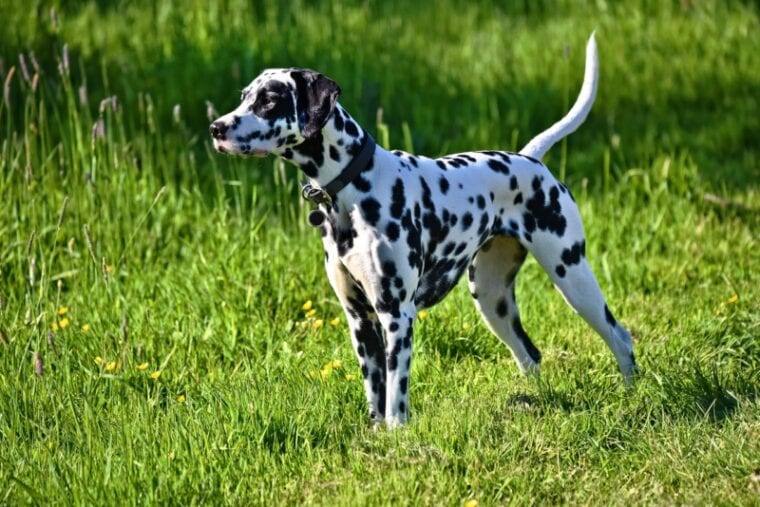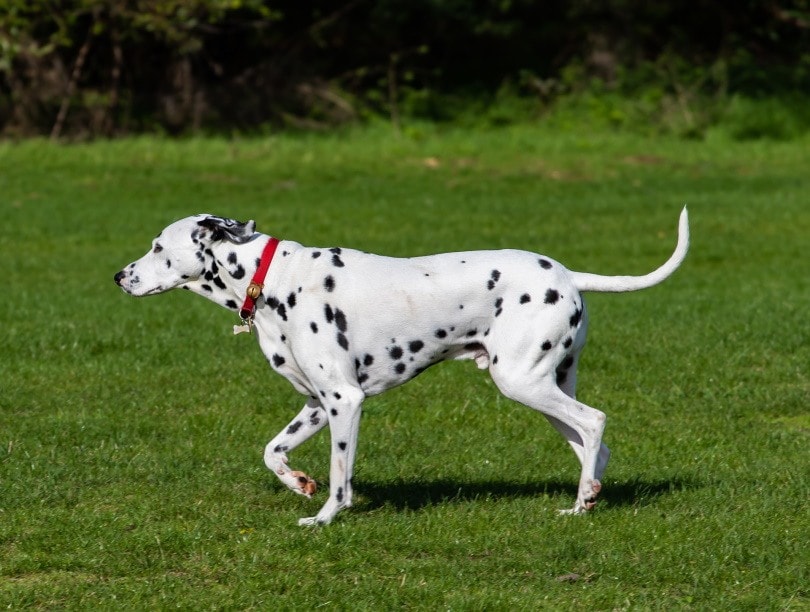
Click to Skip Ahead
Dalmatians are one of the most distinctive and easily recognized breeds in the world. Thanks to their starring roles in several popular films and kid’s TV series, Dalmatians are often adopted or purchased by people who haven’t taken the time to research them completely. One of the most important things you might want to know is whether Dalmatians are aggressive.
It’s tough to make a general statement about how aggressive any breed is because several factors influence this trait, including socialization and individual personality. Typically, Dalmatians are not considered aggressive towards people but they are frequently aggressive toward other dogs. This breed has protective instincts that may require appropriate management, which can lead them to be weary of both dogs and humans, especially ones they don’t know.
In this article, we’ll look at the Dalmatian’s history and personality and how to minimize the chances of aggression toward dogs or people. We’ll also discuss some issues that could increase the Dalmatian’s chances of being aggressive.
All About the Dalmatian
The Dalmatian’s origin story is a bit of a mystery. The breed is named for a specific region of Europe but is not believed to have developed there. All we know for sure is that in the 1800s, Dalmatians became popular as coach dogs in England.
Before assuming their role as horse and carriage protectors, Dalmatians served as military guards, hunting companions, and circus performers. This diverse history has resulted in a fast, active, intelligent, loyal, and protective breed.
In addition to their natural protective instincts, the Dalmatian tends to be cautious around strangers. They are excellent watchdogs too. However, these traits could be misused without proper handling and result in aggressive behavior.

 Other Risk Factors for Aggression in Dalmatians
Other Risk Factors for Aggression in Dalmatians
Poor Breeding
Any time a breed experiences a surge in popularity, such as appearing in a film like 101 Dalmatians, unethical breeders will pop up looking to cash in on the craze. Overbreeding results in dogs with unexpected health and behavior concerns. Poorly bred Dalmatians may have much different personalities than are usually expected.
Badly bred Dalmatians may be nervous, anxious, or unpredictable. All these traits can lead to aggressive behavior if not properly managed.
Deafness
Dalmatians are prone to inherited deafness, which also becomes more widespread due to irresponsible breeding practices. Deaf dogs startle easily and are often more high-strung because they can’t hear what’s happening. It’s also more challenging for them to communicate effectively with humans or other dogs. Deaf dogs are at higher risk of aggressive behavior, usually as a fear response.
 Top 6 Tips to Reduce Aggressive Behavior in Dalmatians
Top 6 Tips to Reduce Aggressive Behavior in Dalmatians
While every dog is different, here are some steps you can take to reduce the chances of a Dalmatian behaving aggressively.

Conclusion
While Dalmatians sometimes don’t get along with other dogs, they are typically not considered aggressive toward people. However, any dog has the potential for aggressive behavior if not correctly socialized, trained, and exercised. Dalmatians can suffer from genetic deafness and overbreeding, which are risk factors for unexpected aggression.
The Dalmatian needs a lot of exercise and attention to prevent bad behavior from developing. Ensure you are prepared for the commitment before bringing a Dalmatian home. Unfortunately, unprepared owners often surrender their Dalmatians to animal shelters because they were expecting a well-behaved movie dog and didn’t realize the work it would take to get it.
Featured Image Credit: MabelAmber, Pixabay


 Other Risk Factors for Aggression in Dalmatians
Other Risk Factors for Aggression in Dalmatians Top 6 Tips to Reduce Aggressive Behavior in Dalmatians
Top 6 Tips to Reduce Aggressive Behavior in Dalmatians



